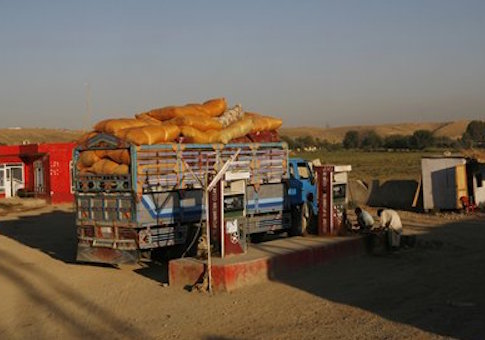The Department of Defense (DOD) spent $43 million on a two-pump gas station in Afghanistan that should have cost $500,000, an "ill-conceived" project that Afghans have little use for, according to a new report released Monday.
The office of the Special Inspector General for Afghanistan Reconstruction (SIGAR) discovered the Pentagon had no explanation for where the funds went, questioning a DOD program that has spent nearly $800 million in the country since 2009.
The Task Force for Stability and Business Operations (TFBSO) program built a compressed natural gas (CNG) automobile filling station in Sheberghan, Afghanistan, with the goal of expanding the natural gas market in the region.
In a scathing letter to Secretary of Defense Ash Carter, Special Inspector General for Afghanistan Reconstruction John F. Sopko blasted the project as an egregious waste of taxpayer funding that has had no economic impact.
"Although TFBSO achieved its immediate objective of building the CNG filling station, it apparently did so at an exorbitant cost to U.S. taxpayers," he wrote. "In comparison, SIGAR found that a CNG station in Pakistan costs no more than $500,000 to construct."
"Furthermore, there is no indication that TFBSO considered the feasibility of achieving the station’s broader objectives or considered any of the potentially considerable obstacles to the project’s success before beginning construction," Sopko continued.
"One of the most troubling aspects of this project is that the Department of Defense claims that it is unable to provide an explanation for the high cost of the project or to answer any other questions concerning its planning, implementation, or outcome," he said.
The Task Force for Stability and Business Operations (TFBSO) was originally created to support the economy of Iraq. The program shifted its focus to Afghanistan in 2009. TFBSO spent $766 million in Afghanistan until 2014.
The gas station project in Sheberghan consisted of two dispensers and four hoses, a CNG trailer filling point, an office building, and compression and processing equipment.
The Pentagon originally awarded the contractor Central Asian Engineering $3 million to build the gas station. The project ended up costing $42,718,739 and took three years to complete.
The vast majority of spending went towards overhead costs. Only $12.3 million were recorded as direct costs, while $30 million went to overhead.
SIGAR cited the International Energy Association, which said the cost of building a similar CNG station in Pakistan ranges between $200,000 and $500,000.
"In short, at $43 million, the TFBSO filling station cost 140 times as much as a CNG station in Pakistan," the report said. "To date, DOD has been unable to provide documentation showing why the Sheberghan CNG station cost nearly $43 million."
The gas station also "produced no discernable macroeconomic gains" and had a "discounted net loss of $31 million."
Aside from the high costs, the project also found to have no use for the average Afghan. Gasoline-powered vehicles must be converted in order to run on CNG, which costs up to $800 per vehicle.
"According to the World Bank, the average annual income in Afghanistan is
$690," SIGAR noted.
"In sum, it is not clear why TFBSO believed the CNG filling station project should be undertaken," the report said. "In the absence of national or even regional natural gas transmission and local distribution infrastructure to support a network of CNG stations, there is no incentive for motorists to convert their vehicles to CNG."
When presented with SIGAR’s findings, the Pentagon could not explain the project’s high cost and said they could not answer questions about the TFBSO program because it shut down in March.
Sopko was not pleased with the department’s answer and vowed to continue investigating the program.
"Frankly, I find it both shocking and incredible that DOD asserts that it no longer has any knowledge about TFBSO, an $800 million program that reported directly to the Office of the Secretary of Defense and only shut down a little over six months ago," he said. "Nevertheless, I intend to continue our inquiry into TFBSO activities to shed additional light on how this program operated, what it achieved, how this enormous amount of money was spent, and whether any conduct by TFBSO staff or contractors was criminal in nature."
